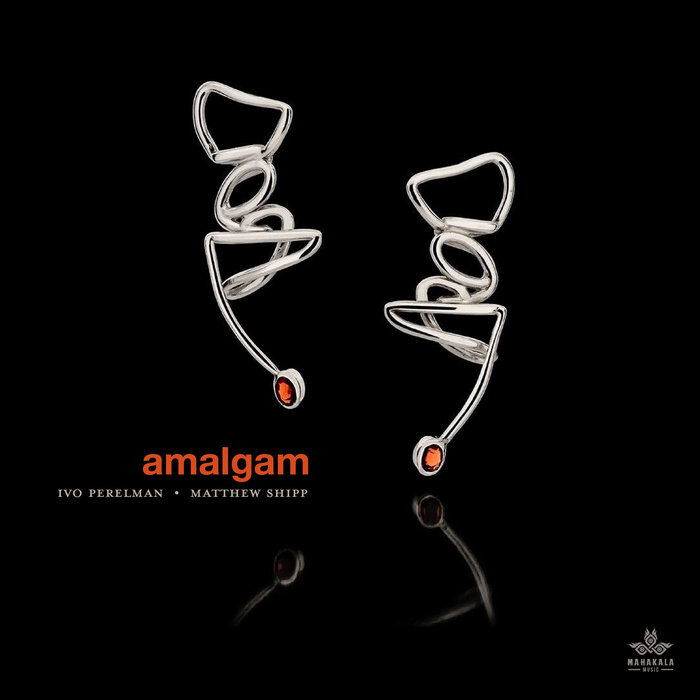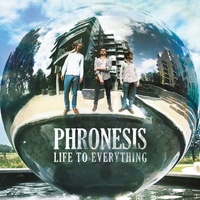They just can’t stop, these two. Ivo Perelman and Matthew Shipp have threatened, on more than one
occasion, to cease and desist. Each time they enter the studio together, just the two of them, they have considered whether it will be the last time for this most engrossing, uncannily linked, long-lived duo: this binary star that, once again, renews itself on Amalgam.
When in 2018 they released the three-CD set Oneness, Perelman made a pronouncement. “This is it,” he said. “I can’t see us making another duo recording [in the studio] in the near future . . . . For now, there’s nothing more to say.” But apparently there was indeed a good deal more: the following year came Efflorescence v.1, a four-CD compilation. And at no point did Perelman and Shipp plan to abandon their public performances, where their concerts comprise uninterrupted improvisations of 45 minutes and more – a quite different species from the smaller, individuated pieces that take shape in the studio (where the “audience” comprises only the musicians themselves). Two such concerts – Live in Nuremberg and Live in New York – have now reached the public as well.
For those of you new to the Perelman-Shipp Duo, keep in mind that the
music you hear has arrived, literally, from nowhere. Especially in the last
decade or so, they have embarked on voyages of total spontaneity in which nothing is predetermined. They work without written music, without themes, without discussion of tempo or texture, or . . . anything, really. These improvisations create their own form as they unfurl; each dictates its own length and mood, its color and complexity. If you hear Perelman and Shipp arrive together at a climax, or meet at some harmonic plateau in their separate flights, the credit goes to a communication that brooks telepathy. At this point in their shared history, they not only complete each other’s sentences. They also start them.
If this seems too remarkable to be true, rest assured that it is both that
remarkable, and completely true.
And yet, before creating the pieces on this album, says Perelman, “We had to ask ourselves, like we always do: ‘Was it time to stop doing this? Did we dry up?’ Because we’re always contemplating the end, and because we have a pact – that if and when we stop producing music that is fresh, we’ll stop recording as a duo. This will never be only some indulgence for us.”
So the question looms: What’s new about this collection? After 35 years of shared music-making – which includes 17 discs documenting this duo, spread out over 10 albums – what else can these two say to each other?
What can they, as a duo, say to the rest of us that they haven’t said before?
The answer rests on an unexpected development in their shared evolution, a left turn that not even they saw coming. The answer concerns a shift in focus, from the macroscopic to the microscopic; from relentless exploration to an intense consolidation of concepts and material. The answer is Amalgam.
On previous albums, these two displayed a breadth of improvisation that proved marvelous, expansive and explosive. But here, they have turned that intrepidity inward; instead of exploring outer space, they send their music hurtling through the space between molecules. This is fusion, not fission. On Amalgam, Perelman and Shipp do not split the hydrogen atom; rather, they dive down into it. They have stripped away discursive ornamentation, no matter how delightful it has proved in the past. The material is compressed; redundancies recede.
“We play less now and say more,” Perelman agrees. “We are having a new appreciation for the space between notes and between chords. So now each note carries more weight in the overall structure; each note breathes because of the space around it.” (It’s worth remembering that, like the duo, the hydrogen atom is the simplest and most elegant in nature, made up of two inextricably linked entities.)
Click on over to Track 8, for one example. The goose-honks and bird-trills that Perelman offers at the start are echoed in the moaning siren song at the conclusion. In between, the saxophone’s altissimo utterances contain elements of both (and a fair amount of pixie dust as well), as the piano maintains a solemn pulse that both bolsters and
embraces its partner. It’s only five minutes long, but it contains a universe of compacted information, each packet existing in its own sphere.
How about Track 2 for contrast? Sticking largely to the middle register,
Perelman revels in old-school lyricism (although it wears a uniform of modern pantonality); Shipp follows suit, offering interjections that alternately pummel and swing, without altering the piece’s fundamental nature. The hide-and-seek of Track 4 may bound from pillar to post, but it doesn’t quit the game, from start to finish. Similarly, the tumultuous Track 9 never flags, not even when the texture thins; not even when the Perelman and Shipp move in lockstep (rather than the contrary motion that applies to most of the piece). On Track 5 they find a multitude of shades within the music’s deep purple, yet the underlying color doesn’t vary.
All different, yet all with a shared quality: more than on any of their previous recordings, each portion of Amalgam has a uniquely consistent cohesion. On every track, Perelman and Shipp maintain an integrity of purpose that deliberately skirts the more flamboyant gestures of which they are so eminently capable. “It comes from having played so much together, and knowing what the other thinks and how he’ll respond,” says Perelman.
“The album is like a book,” he adds. “Before, if you missed one chapter, you might not miss the overall flavor of the book. But that’s not the case here; each track has its own character and flavor. We’re not only getting better at playing the music, but also in creating a record that doesn’t repeat itself –one where each chapter is self-contained.”
They just can’t stop, these two. Thank the stars for that.
NEIL TESSER
(19526900308)
| SKU | 19526900308 |
| Barcode # | 19526900308 |
| Brand | Mahakala Music |
Be The First To Review This Product!
Help other Birdland Records users shop smarter by writing reviews for products you have purchased.










